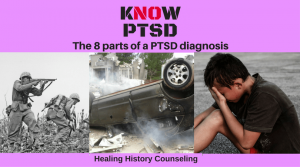
 How does a therapist, Psychiatrist, or doctor determine if someone has PostTraumatic Stress Disorder (PTSD)? In the United States we use the DSM-5. The Diagnostic and Statistical Manual of mental disorders, fifth edition (DSM-5) is the book, created by the American Psychiatric Association, that spells out what an individual must be experiencing to be diagnosed with PTSD. In this post I’m going to explain the eight criteria without the overly technical terminology so prevalent in the DSM-5.
How does a therapist, Psychiatrist, or doctor determine if someone has PostTraumatic Stress Disorder (PTSD)? In the United States we use the DSM-5. The Diagnostic and Statistical Manual of mental disorders, fifth edition (DSM-5) is the book, created by the American Psychiatric Association, that spells out what an individual must be experiencing to be diagnosed with PTSD. In this post I’m going to explain the eight criteria without the overly technical terminology so prevalent in the DSM-5.
- Exposure to a traumatic event. The event must happen to you, or you must witness it happen to someone else, or you are repeatedly exposed to the aftermath of the traumatic event (a common cause in first responders). You can’t hear about the event from someone or see it in the media… With one very important exception: If you learn about it happening to a close family member or close friend, it qualifies.
- Intrusive symptoms. After the traumatic event you must experience at least one of these:
- You can’t stop thinking about it.
- You’re having upsetting dreams about it.
- You keep having flashbacks (when you believe, feel, or react as if the event is happening right now).
- You change your life to avoid people, events, or situations which might bring up thoughts, feelings or memories of the trauma (such as a Vet avoiding fireworks shows). Or simply trying to avoid feeling, thinking or remembering the trauma (examples might be frantic business or the use of drugs or alcohol).
- Negative shift of thinking or mood. You must experience at least two of the following:
- You can’t remember part or all of the traumatic event (not due to head injury, alcohol, or drugs). Or the memory is all jumbled up.
- Extreme negative beliefs about self, others or the world (for example: believing you’re worthless, all men are shit, etc.).
- Distorted thoughts about cause or consequences that results in blaming self or others. (a rape victim blaming themselves for the assault).
- Persistent negative mood: Sadness, guilt, shame etc., Like a heavy blanket over everything.
- Detachment from others. Feeling like others don’t get it or isolating yourself.
- Overall inability to feel positive emotions. This can feel like a deadness inside.
- Major change in arousal or reactivity. Two or more of the following:
- Being constantly irritated or getting angry very easily.
- Behaving Recklessly or acting with a disregard for your own safety.
- Always being on guard or being very jumpy.
- Scattered thinking or problems concentrating.
- Difficulty sleeping – can’t fall or stay asleep or sleep is restless or not restful.
- Length of time. You must experience the symptoms above for a month or longer.
- Impact. It’s got to suck and be messing up your life.
- No other cause. Talk therapy will not cure a heart attack or other medical condition. So, it is always a smart idea to have a doctor check that There is no other physical, medical or chemical explanation for your symptoms.
If reading this list makes you wonder if you are struggling with PTSD, I want you to know that there is hope, there is help and you can get better. I am an EMDR trained therapist in Austin Texas that specializes in healing trauma and PTSD. If you live in Austin, please call to schedule a free consultation to see how I can help. If you live further away please contact a therapist trained to treat trauma.
A difficult childhood or a traumatic event does not have to ruin your adult life. Healing is possible. Contact me to schedule your free 30 minute consultation.
I feel I suffer from PTSD I have never gone to counseling but I do know I need help.
Please do seek help! If you live in Texas, I may be a good option. Schedule a free consultation here: https://clientportal.powerdiary.com/clientportal/hhcc
I have just come terms with my diagnosis of CPTSD. I had what I came to call a flashback yesterday. It was so real and I was on the bathroom floor in tears wondering why I responded the way I did to a “memory”. Anyways that led me to google flashbacks vs memories. Here is where I landed and wanted to thank you for helping me understand what in the hell has been going on with me. I’m glad you are doing what you are with the articles. Just know they are helping someone.